
Anirban Ray PhD Student in Computational Image Restoration | Generative AI for Microscopy
About Me
I am a final year PhD Student in Computer Science at Technische Universität Dresden & Human Technopole, Italy, advised by Dr. Florian Jug. My research focuses on developing flow-matching models to restore degraded biological images and applying other deep learning methods to inverse problems in microscopy for biological data, advancing the intersection of artificial intelligence and the life sciences. I am passionate about AI4Science and deeply interested in how science philanthropy can accelerate discovery and innovation.
I hold a Masters degree in Computer Vision and Deep Learning from Nagoya Institute of Technology, Japan (2018), where I was advised by Professor Jun Sato and co-advised by Associate Professor Fumihiko Sakaue. Before beginning my doctoral journey, I worked as an Associate AI researcher at Hitachi Research in Tokyo, applying deep learning to visual understanding and bioimage analysis.
I earned my Bachelors in Computer Science in Chennai, India, and was born and raised in Kolkata, India, where I completed my Secondary and Higher Secondary education. Outside of research, I enjoy staying active through badminton, ping pong, and hiking, and I also keep a light strength-training routine as well.
Education
PhD in Computer Science | 2022 – 2026 (expected) Technische Universität Dresden & Human Technopole, Italy
Master of Engineering in Computer Science | 2016 – 2018 Nagoya Institute of Technology
Advisor: Prof. Jun Sato and Prof. Fumihiko Sakaue | Thesis
Research Student | Oct, 2015 – Mar, 2016 Nagoya Institute of Technology
Advisor: Prof. Jun Sato and Prof. Fumihiko Sakaue | Preparatory phase for Master’s thesis on Computer Vision and Deep Learning.
Bachelor of Tech. in Computer Science and Engineering | 2011 – 2015 Vel Tech Rangarajan Dr. Sagunthala R&D Institute of Science and Technology
Teaching Experience
Teaching Assistant – DL4MIA | 2022, 2023, 2024
Human Technopole, Milan, Italy
Supported the Deep Learning for Microscopy Image Analysis (DL4MIA) course across three consecutive editions. Responsibilities included mentoring participants, invited lecture, coding sessions, and guiding project work on AI-based microscopy restoration and segmentation.
Teaching Assistant – DL@MBL | 2023, 2024Marine Biological Laboratory, Woods Hole, USA
Contributed to hands-on sessions on deep learning for biological imaging. Provided mentoring and technical guidance to participants during lab exercises and research projects. One of the project started in the group that I co-mentored, ended up being published in NeurIPS 2024 and another work on improving RESOLFT Microscopy with deep learning is currently under review.
Work Experience
Associate Researcher | Apr 2018 – Jan 2022 Hitachi Ltd., Tokyo, Japan
Applied Deep Learning and Computer Vision for image analysis in the R&D Group’s Center for Technology Innovation.
Engineering Intern (AR Applications) | Sep 2016 Sun Corporation, Konan, Japan
Developed augmented reality applications for AceReal smart glasses using Unity and Vuforia frameworks. Find the official evaluation report in Japanese here, and an interactive ChatGPT translated version here.
Engineering Intern (Cloud Services) | Aug 2014 – Jan 2015 Machine Pulse (Mahindra Teqo), Mumbai, India
Analyzed large-scale database migration strategies for renewable energy and logistics cloud systems.
Special Achievements
Selected Participant – Optical Microscopy & Imaging in the Biomedical Sciences (OMIBS) | 2023 Marine Biological Laboratory, USA
Selected for this prestigious advanced microscopy course at the Marine Biological Laboratory, covering cutting-edge optical imaging techniques in biomedical sciences. Our team won the 3rd Place in microscopy imaging.
Invited Contributor – Alumni Voice Column | 2018 The University of Tokyo
Invited by the Government of Japan and the University of Tokyo to share academic and professional experiences as part of Japan’s international education initiative.
Selected Participant – International Computer Vision Summer School (ICVSS) | 2017 ICVSS, Italy
Chosen among 150 top global students (mostly PhDs) for advanced training and research presentation in computer vision.
Aichi Monozukuri Scholarship | 2015 Aichi Prefectural Government, Japan
Awarded full funding for Master’s studies at Nagoya Institute of Technology. Selected among the top 10 students in Asia.
Selected Participant – Undergraduate Summer School on Computer Science | 2013 Indian Institute of Science, Bengaluru India
Chosen among 60 top students from India for advanced topics and research presentation in computer science.
Talks
List of my selected talks
HazeMatching at the introduction to ML course • Jul 2025
Human Technopole | 📍 Milan, ItalyHazeMatching at the institute seminar series • Apr 2025
Human Technopole | 📍 Milan, ItalyIntroduction to Diffusion Model for Microscopy • May 2024
EMBO-DL4MIA | 📍 Milan, ItalyTalk on OpenAI’s Sora • Feb 2024
Human Technopole Research Seminar | 📍 Milan, ItalyA talk introducing deep learning and computer vision • Aug 2022
Vel Tech University | 📍 Chennai, India
Skills
Computational Skills
Python, PyTorch, OpenCV, NumPy, LaTeX, Git, SLURM, Bash, Linux
Spoken Languages
Bengali (Native), Hindi (Fluent), English (Fluent), Japanese (Conversational), Italian (Elementary)
Research
Current Research (PhD, 2022–Present)
RESOLFT time lapse imaging empowered by deep learning
Guillaume Minet, Anirban Ray, Francesca Pennacchietti, Giovanna Coceano, Florian Jug, and Ilaria Testa
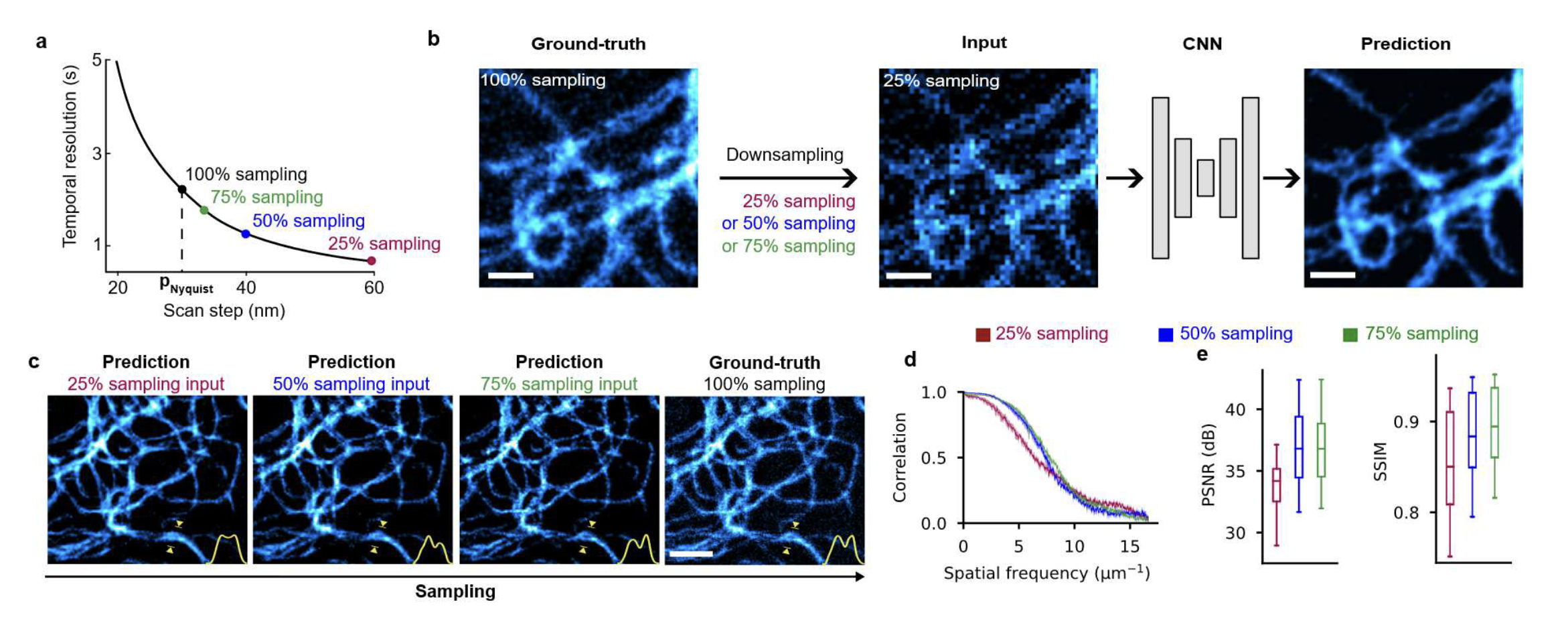
Deep learning extended RESOLFT nanoscopy by restoring low-SNR and sub-sampled acquisitions, enabling 5× longer imaging with 10× lower dose of light per frame, or a 4× increase in imaging speed for faster live-cell imaging while preserving ~60 nm resolution. This method enables reduced photobleaching and accelerated volumetric recording, revealing previously inaccessible sub-organelle dynamics in living cells.
Preprint (under review) | AI Generated infographic 
ResMatching: Noise-Resilient Computational Super-Resolution via Guided Conditional Flow Matching
Anirban Ray, Vera Galinova, and Florian Jug
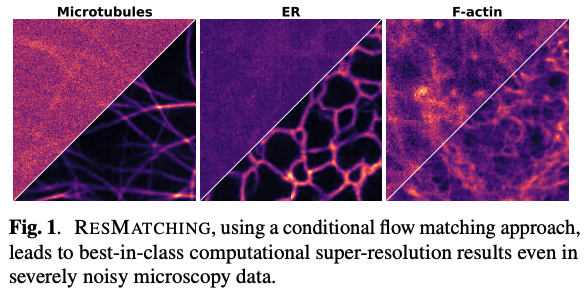
A guided conditional flow-matching framework for noise-resilient computational super-resolution in fluorescence microscopy, unifying restoration, uncertainty estimation, and posterior sampling within a single generative model.
Paper (arXiv) | Project Page | AI Generated infographic 
HazeMatching: Conditional Flow Matching for Microscopy Dehazing
Anirban Ray, Ashesh, and Florian Jug
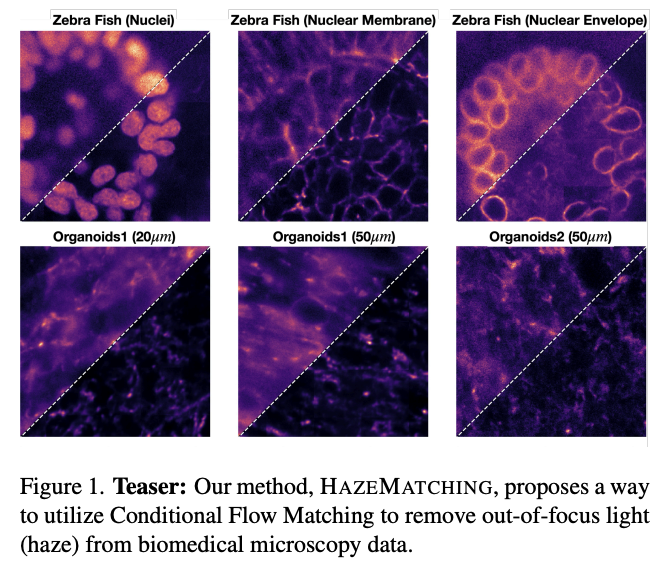
A generative framework that restores optical microscopy images degraded by scattering and haze using Conditional Flow Matching (CFM). HazeMatching models the mapping between widefield and confocal modalities, enabling clearer visualization of biological structures.
Paper (arXiv) | AI Generated infographic 
Past Research (Hitachi Ltd., 2018–2021)
Deep Learning for Microscopy Image Analysis
From 2018 to 2021, my research at Hitachi Ltd., Tokyo focused on developing deep learning–based systems for high-precision image understanding in biomedical microscopy. I worked on combining computer vision and AI-driven automation for identifying and quantifying objects of interest in complex visual data.
Publications:
- Quantitative Analysis System for Bacterial Cells in SEM Images Using Deep Learning (CISS 2021) — introduced a neural architecture for accurate segmentation and counting of bacterial cells from scanning electron microscopy (SEM) data. | AI Generated infographic
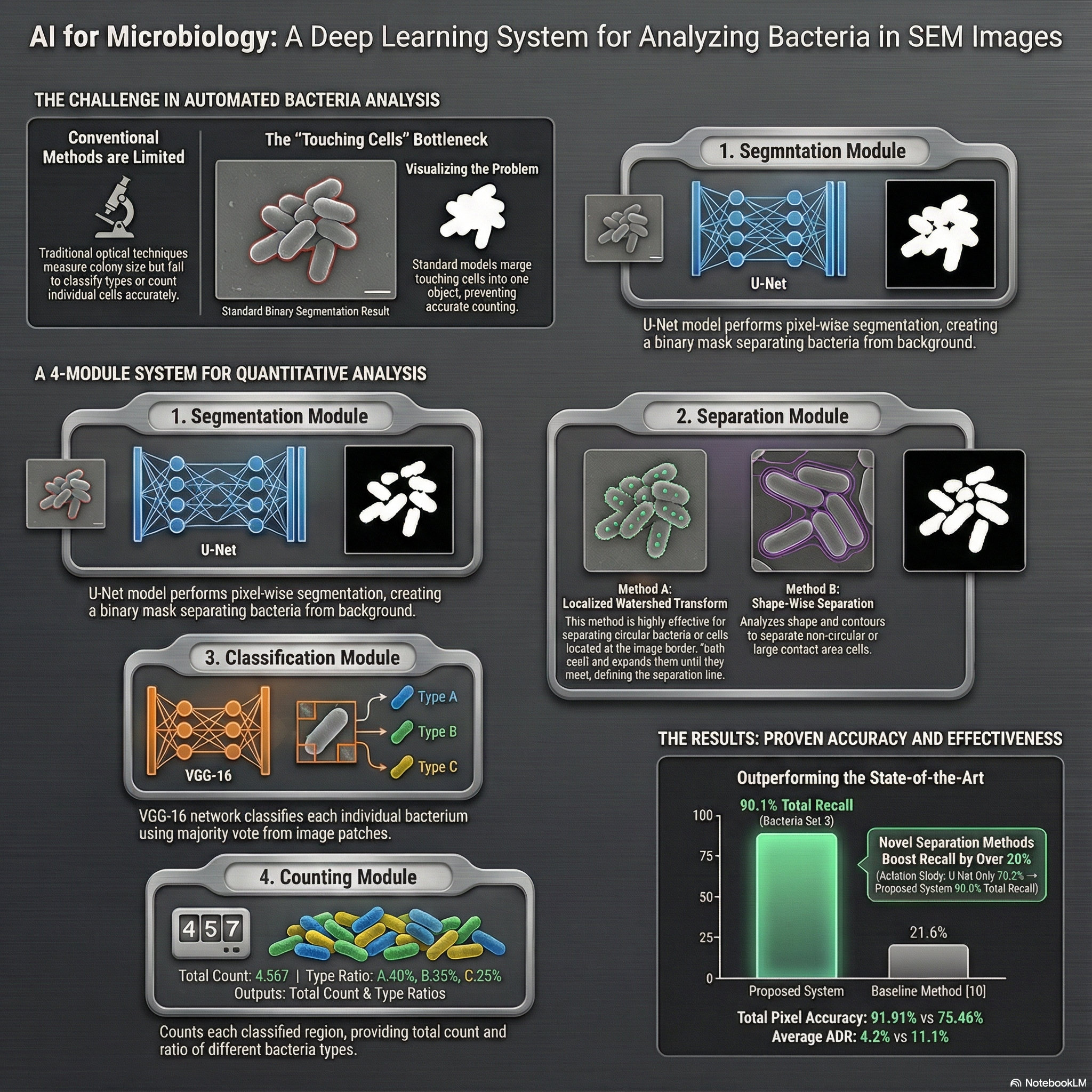
- Deep Learning Based Bacteria Classification from SEM Images Using a Combination of Membrane and Internal Features (CISS 2022) — improved bacterial classification by jointly modeling morphological and internal structural cues. | AI Generated infographic

Patents:
- US Patent 12327363 — methods and apparatuses for generating neural models that identify and segment objects of interest from images. | AI Generated infographic
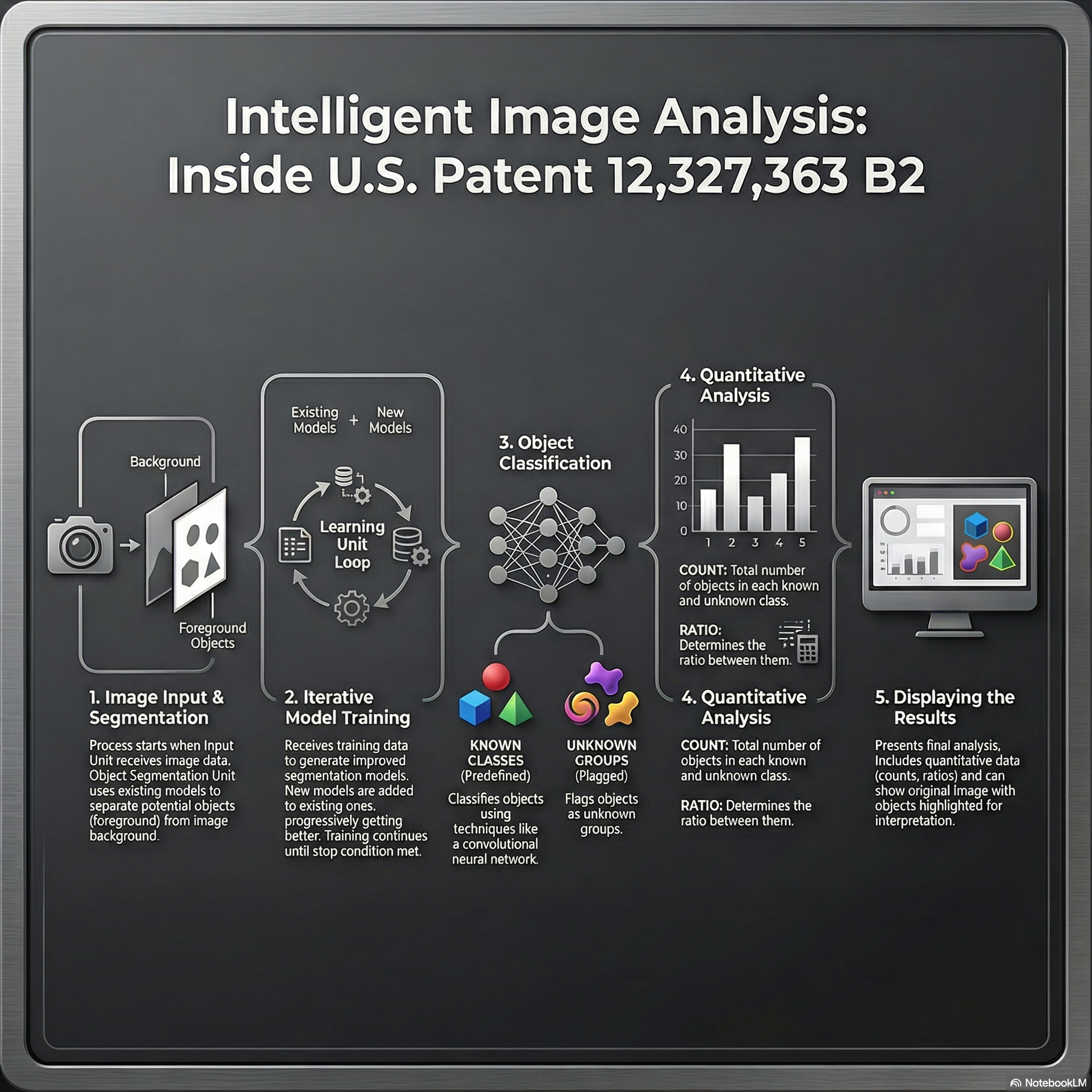
- US Patent 12211213 — adaptive feature extraction and object detection for microscopy imaging. | AI Generated infographic
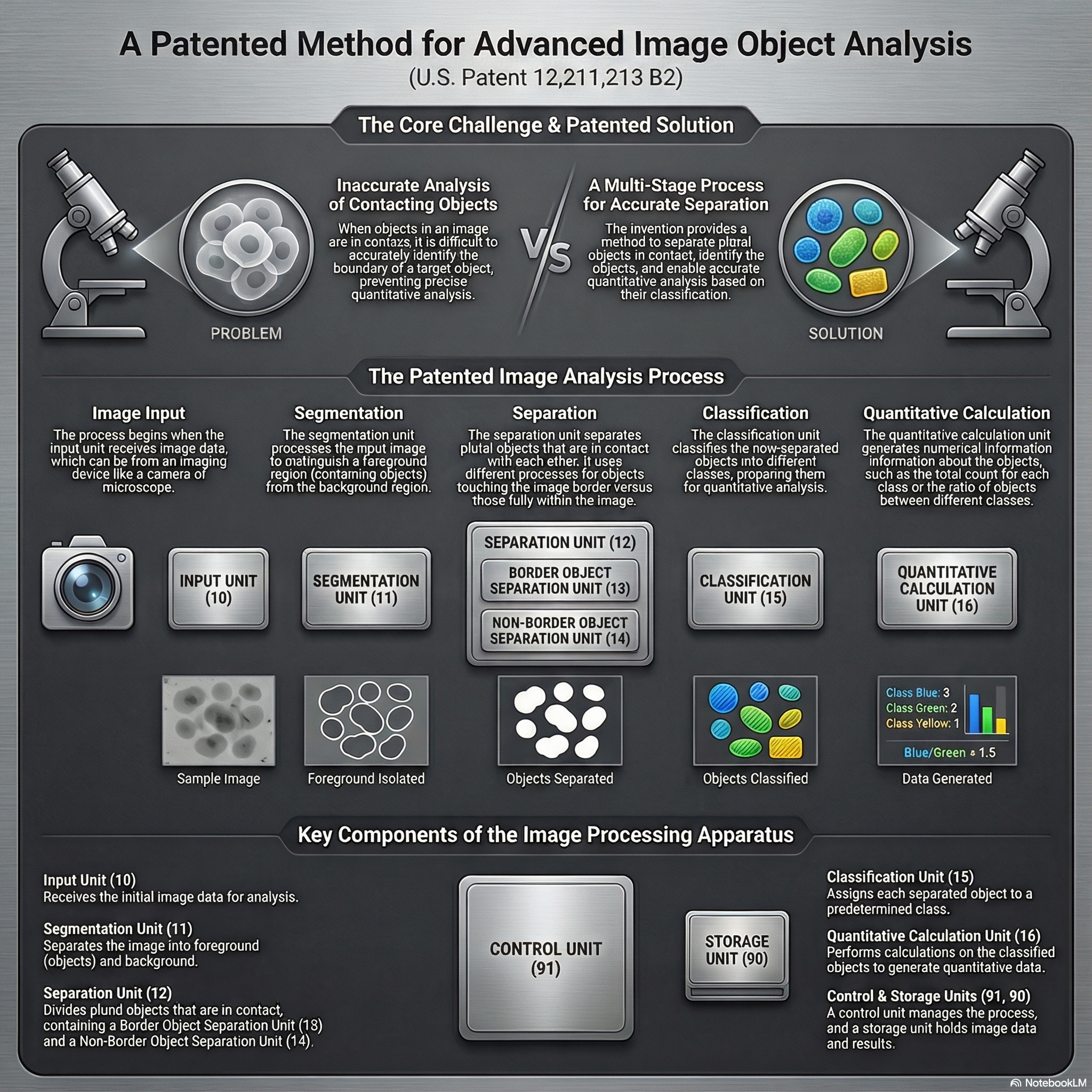
- EP Patent 3961562A1 — AI image-processing systems for industrial and microscopy applications. | AI Generated infographic

This phase of my work established a foundation in AI-driven visual understanding, bridging industrial automation with quantitative biological imaging, and set the stage for my later research in generative and flow-based models for microscopy restoration.

Past Research (Masters Thesis, 2016–2018)
Modeling the Feature Evolution in CNNs using LSTM
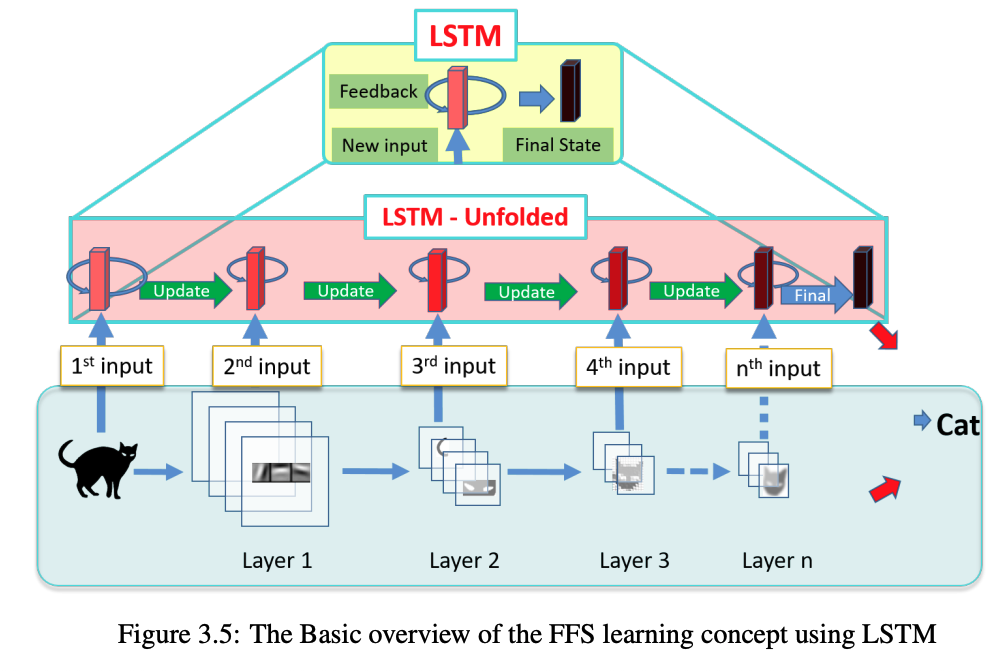
During my master’s studies at Nagoya Institute of Technology, Japan (2018), I explored the temporal dynamics of feature representations in Convolutional Neural Networks (CNNs) using Long Short-Term Memory (LSTM) networks. My research focused on understanding how features evolve across layers in CNNs and leveraging LSTMs to model these transitions for improved image classification performance. Read more about it in my thesis. | AI Generated infographic 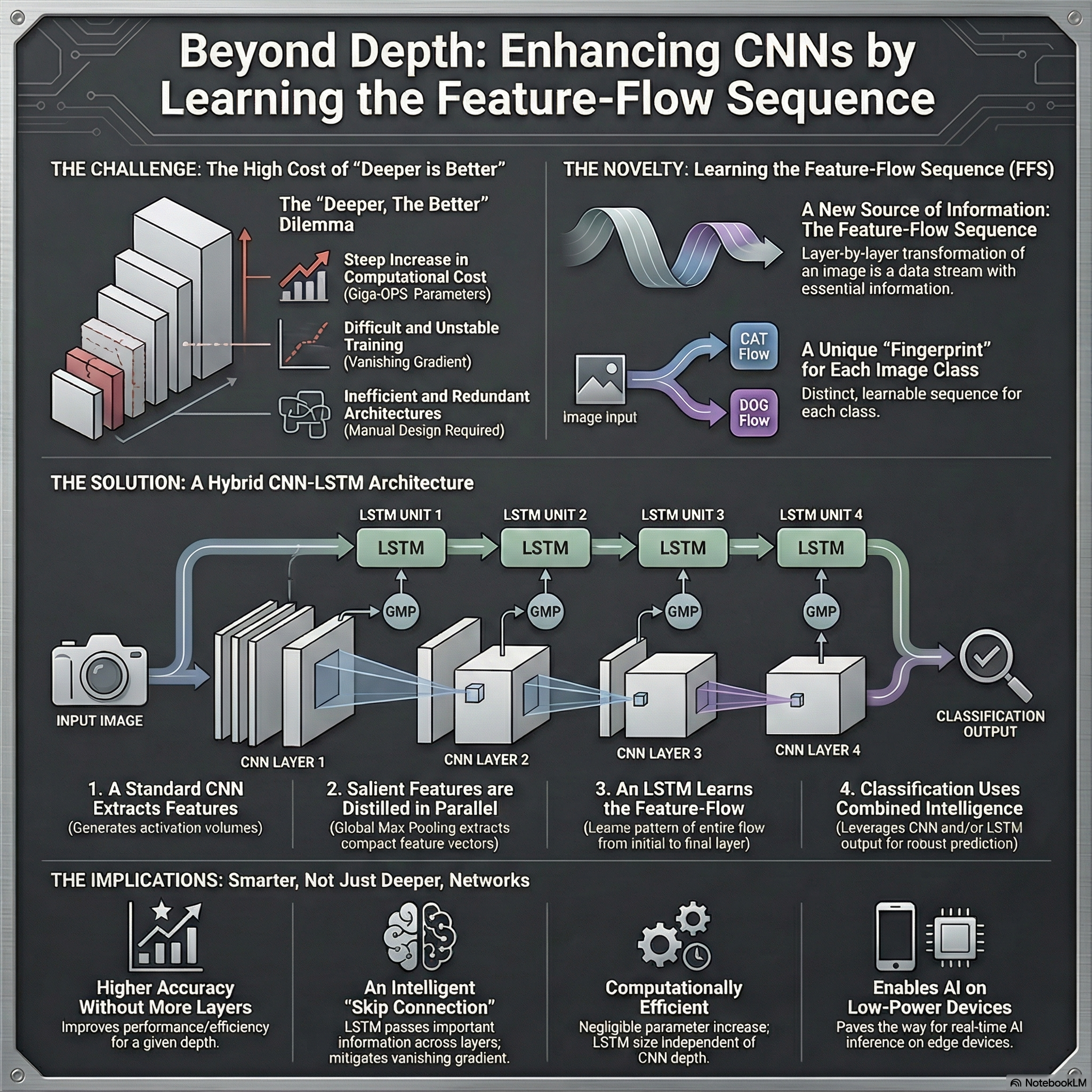
(Note that AI Generated infographics are representational only)